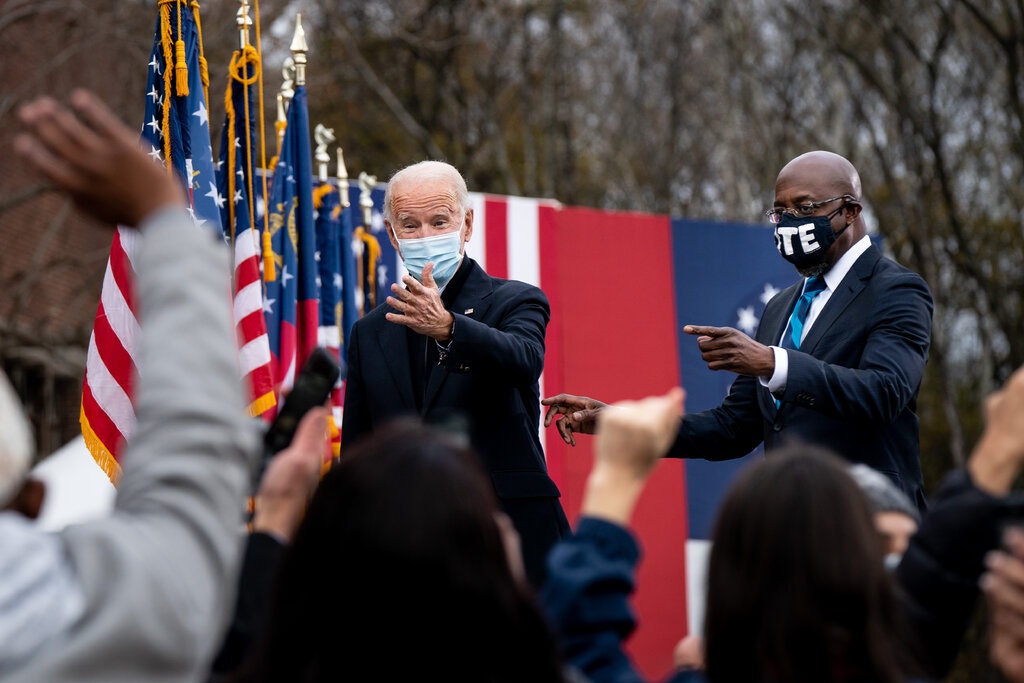By Salome Dermati,
The 2020 election period in the U.S. is nearly over. President-elect Joe Biden and his Vice President (VP) Kamala Harris are scheduled to formally succeed Donald Trump on January 20th. Congress, however, hangs in the balance between Republicans and Democrats. Just two Senate seats remain vacant, those representing the state of Georgia. The qualitative significance of their ultimate placement is deemed as exceptionally consequential.
Apart from the presidential race, multiple local, state, and federal elections were held on the same day throughout the country. Regarding the U.S. Senate, 35 seats (out of 100) were up for election, whereas two of those resulted from an irregular incident; John McCain’s (R – Arizona) death in 2018 and Johnny Isakson’s (R – Georgia) resignation in 2019. In the southern state, a special election was carried out to fill the latter’s seat, as well as a regular one.
What is more, the election system in Georgia dictates that no candidate can be declared the winner unless they secure a minimum of 50% of the votes, also referred to as a true majority. Consequently, a runoff election is appointed between the two contenders who gathered the most votes in the first round. Nevertheless, in 1990 the Federal Justice Department unsuccessfully sued the state on account of this process’ racially charged motives against the African-American community.
 This was the case in both races, thus producing a unique condition. The Republican incumbents David Perdue and Kelly Loeffler will face off their Democratic challengers Jon Ossoff and Raphael Warnock respectively on January 5th. On the one hand, Perdue, a 71 years old businessman and one of the wealthiest members of Congress, is opposed by Ossoff, a 33 years old filmmaker. At the same time, Loeffler was delegated in order to fill Isakson’s rest of the term and is now running as a Trump-loyalist (she has also refrained from publicly acknowledging Trump’s loss), whereas Warnock is a Black pastor from Atlanta. Both Democratic candidates have considerably surpassed their competitors in terms of funding, while Ossoff became the best-funded Senate candidate in U.S. history with approximately $107 million in two months (October-December).
This was the case in both races, thus producing a unique condition. The Republican incumbents David Perdue and Kelly Loeffler will face off their Democratic challengers Jon Ossoff and Raphael Warnock respectively on January 5th. On the one hand, Perdue, a 71 years old businessman and one of the wealthiest members of Congress, is opposed by Ossoff, a 33 years old filmmaker. At the same time, Loeffler was delegated in order to fill Isakson’s rest of the term and is now running as a Trump-loyalist (she has also refrained from publicly acknowledging Trump’s loss), whereas Warnock is a Black pastor from Atlanta. Both Democratic candidates have considerably surpassed their competitors in terms of funding, while Ossoff became the best-funded Senate candidate in U.S. history with approximately $107 million in two months (October-December).
Both races are still too close to predict. Georgia has systematically voted red in the last decades, and both Republican candidates gained more votes than their rivals on November 3rd. However, record voter turnout levels in the state, most of which is attributed to Stacey Abrams, an African-American politician and activist who lost her gubernatorial race to Brian Kemp in 2018, could unlock a Democratic triumph.
Every registered voter can cast their ballot once again, regardless of their first choice, by voting either on that designated day or earlier in-person or via mail. Similarly to the presidential election, the final outcome may be delayed due to the higher number of mail-in votes that are expected to come in and take longer to count. This will amount to the already tense political climate, given that the result of the runoff elections will complete the partisan landscape of the Senate, one of the two bodies of the legislative branch. Both Ossoff and Warnock need to win so as to raise their party’s total seats to 50 and unofficially gain majority, thanks to VP Harris who will preside over the Senate and can cast tie-breaking votes. Republicans only need either one of the two wins.
Until this issue is resolved, the Senate remains in limbo at the expense of the Biden administration. No confirmation hearing for his nominees for the executive and independent agencies has been arranged, although Senate Minority Leader, Chuck Schumer, suggested that they begin “immediately after the Georgia elections”. In addition, it is reported that Biden’s candidates have held more than 170 online meetings with senators so as to prevent any further setbacks. Traditionally, the inauguration of the President coincides with the confirmation of the incoming national security officials.
A Democratic majority in both chambers of Congress, meaning the Senate and House of Representatives, guarantees a successful implementation of Biden’s agenda. Whether it is signing a big coronavirus stimulus, rejoining the Paris Agreement and approving more relevant reforms, or canceling student debt, many of his campaign promises will soon be put to the test. Nonetheless, Senate Majority Leader, Mitch McConnell, has notoriously named himself the “grim reaper” of Congress, signalling his intention to block any progressive or reformist bill.
In light of this recent development, it is worth revisiting three examples of the last decade that correspond to different scenarios. Firstly, Obamacare, formally known as Affordable Care Act or ACA/PPACA, was put into effect in 2011, when Democrats controlled both the White House and Congress, even though every Republican voted against it. By contrast, in 2015 Barack Obama signed an executive order that allowed the U.S. to join the Paris Agreement on climate change, therefore bypassing the legislative branch, given its Republican majority at the time. Thirdly, Donald Trump realized his first, and last, legislative win when the Tax Cuts and Jobs Act (TCJA), “the most sweeping overhaul of the U.S. tax system in more than three decades”, was ratified in 2017.
Biden has achieved a historic milestone by turning Georgia blue after 28 years; Bill Clinton was the last Democrat to win the state in a presidential election. Biden’s legacy as President, however, remains uncertain until the last two Senate seats are confirmed in his favour. By controlling both chambers of Congress, Biden will be on path to become a powerful president and effectively transfer the country to a post-Trump era.
References
- Ballotpedia, United States Senate elections, 2020. Available here.
- Ballotpedia, United States Senate runoff elections in Georgia (January 5, 2021). Available here.
- BBC, Climate change: US formally withdraws from Paris agreement, Available here.
- BBC, Trump’s tax bill: US Senate passes reform legislation. Available here.
- Politico, Democrats shatter fundraising records ahead of Georgia Senate runoffs. Available here.
- Politico, How the Georgia runoffs could delay Biden’s Cabinet. Available here.





